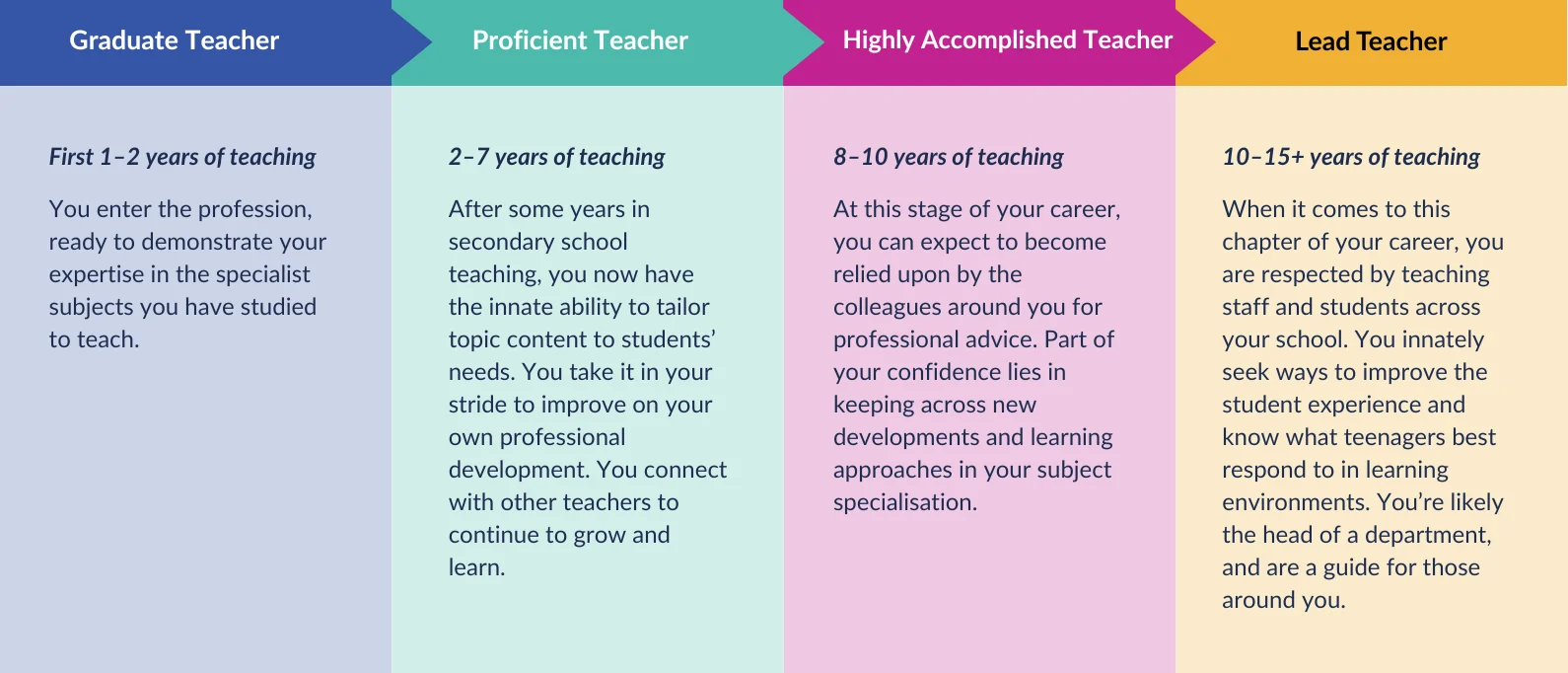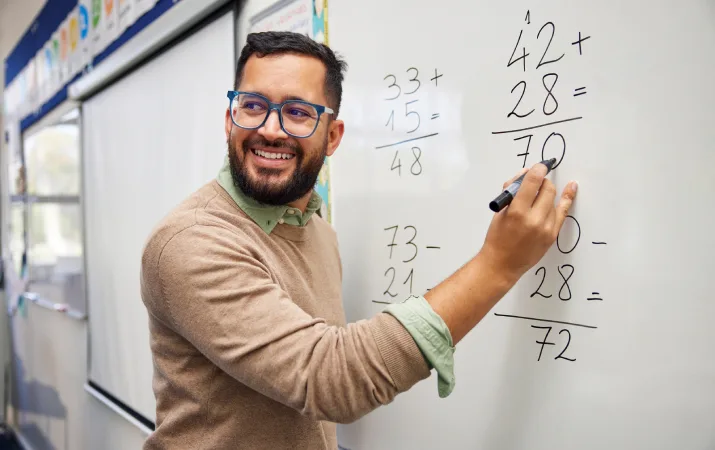How to become a secondary school teacher
Inspire and lead teenagers in the classroom.
Quick facts
What do I need to study?
A Bachelor of Education (Secondary Education)
How much can I earn?
$2,166 median weekly salary*
What’s the job market like?
5,200 new jobs in the past year**
Is this career a good fit for you?
You’re a great fit for a career in secondary school teaching if you:
Have a strong passion for the subjects you wish to teach
Love discussing topics relating to your field of interest with anyone who will listen
Can draw upon patience when dealing with the emotional needs of others
Are excited about shaping the minds of learners
Feel energised when surrounded by teenagers and young adults
Are the person teenagers don’t mind talking to at family gatherings
What does a secondary school teacher do?
Secondary school teachers are a cornerstone influence on the next generation of adults, responsible for delivering a prescribed curriculum to teenagers spanning the ages of 12-18. They also form an important part of their students’ emotional development as they become young adults.
Daily tasks
Teach a prescribed curriculum for your specialist subject(s) to the teenagers in your classroom. You can choose whether you specialise in English, Mathematics, Science, Drama, Music, Physical Education, Home Economics, History and more.
Demonstrate learning through discussion within your class so that students remain engaged in the subject matter.
Create learning plans that will incite passion in students, sometimes leading them to decide on a career in the field for themselves.
Prepare students for exams and assessments according to the curriculum, including Year 12 exams in preparation for higher education study, should you be teaching senior classes.
Mark homework and assessments for pupils, providing constructive feedback to help them improve over the course of the year.
Discuss your students’ progress at regular points throughout the year. At times, you may need to work with the principal, tutors, student counsellors and other teachers if your pupil requires additional support.
Provide career counselling on the subject you teach, should students wish to learn more about working in the field once they graduate high school.
Be an active participant in staff meetings, conferences and workshops to maintain a professional standard of teaching.
Join in on excursions, camps, sport carnivals, school concerts and other activities at your secondary school.
Supervise up and coming teachers who may be on placement during the academic year.

How to become a secondary school teacher in Australia
Undergraduate pathways to becoming a secondary school teacher
If you haven’t completed university study before, you will need to:
Choose and complete the pathway that best suits your level of experience below.
Apply for and complete a Bachelor of Education (Secondary).
Register to become accredited with the state or territory you wish to teach in.
Pathway Option 1: Open Access | Pathway Option 2: Undergraduate Certificate | Non-Pathway Option: Bachelor Degree |
Ideal if you: - Don’t have an ATAR. - Want to see how you handle a small amount of study to begin with. With this pathway option, you’ll gain entry into a Bachelor of Education (Secondary) by successfully completing Open Access single subjects first. | Ideal if you: - Meet little to no entry requirements. - Want to achieve a standalone certificate to begin with. With this pathway option, you’ll gain entry into a Bachelor of Education (Secondary) by completing an undergraduate certificate first. | Ideal if you: - Already have the required ATAR score listed on the course page you are interested in - Want to get started with a full degree straight away With this option, you’ll apply for entry into a Bachelor of Education (Secondary) using your existing ATAR or relevant academic experience. |
Postgraduate path to becoming a secondary school teacher
If you completed university study in a different field before deciding to become a secondary school teacher, you will need to:
Complete a Master of Teaching (Secondary).
Register to become accredited with the state or territory you wish to teach in.
Your undergraduate course options
Bachelor of Education (Secondary Education) (The Arts - Visual Arts)
UndergraduateCUR-SAR-DEG
Encourage a passion for performing in learners
Boasting a new course structure, this degree promises to hone your skills as a visual arts teacher. Gain the skills needed to teach The Arts in Years 7-12 with new subjects and a chance to take on professional experience subjects throughout.
- Study method
- Online & on-campus
- Duration
- 4 years full time or part time equivalent
- Entry requirements
- No ATAR required. Start with a subject.
Bachelor of Education (Secondary)
UndergraduateSCU-SEC-DEG
Get qualified to work as a registered secondary school teacher
Learn to teach young adults in high school. After covering the fundamentals of literacy and numeracy, choose from a wide range of curriculum specialisations. Put theory into practice during your professional experience placement in the classroom.
- Study method
- Online & on-campus
- Duration
- 4 years full time or part time equivalent
Bachelor of Education (Secondary)
UndergraduateUSQ-BES-DEG
A flexible and industry engaged secondary teaching degree
Prepare to educate in high school classrooms across your chosen subject areas. You’ll get to know how people develop and learn. Explore teaching and curriculum for Years 7 to 12. Includes professional experience in mainstream and alternative settings.
- Study method
- Online & on-campus
- Duration
- 4 years full time or part time equivalent
Bachelor of Education (Secondary Education) (Humanities and Social Sciences Education - Geography)
UndergraduateCUR-SGE-DEG
Ground your students’ love of geography
Boasting a new course structure, this degree promises to hone your skills as a geography teacher. Gain the skills needed to teach Geography in Years 7-12 with new subjects and a chance to take on professional experience subjects throughout.
- Study method
- Online & on-campus
- Duration
- 4 years full time or part time equivalent
- Entry requirements
- No ATAR required. Start with a subject.
Your postgraduate course options
Master of Teaching (Secondary Education)
PostgraduateCUR-SEC-MAS
An Initial Teacher Education qualification in order to register as a teacher in Australia
Develop advanced critical skills, knowledge and understanding for best practice in secondary education. Curriculum areas offered are: English, The Arts, Mathematics, Physical Education, Science, and Humanities and Social Sciences (HASS).
- Study method
- Online & on-campus
- Duration
- 2 years full time or part time equivalent
Master of Teaching (Secondary)
PostgraduateSWI-MTS-MAS
Teach in high schools across Australia
Become a secondary school teacher. You’ll study teaching techniques and the theories of learning. Explore everyday school life during teaching placements. Over the course of 2 years, you’ll enjoy professional support and diverse experiences.
- Study method
- Online & on-campus
- Duration
- 2 years full time or part time equivalent
Master of Teaching (Secondary)
PostgraduateACU-EDS-MAS
Develop young minds in secondary schools
Pursue an exciting new career in education based on your life experience and prior studies. Specialist teaching areas include drama, economics, physics, and more. Includes supervised work placements to practice teaching in high school.
- Study method
- Online & on-campus
- Duration
- 2 years full time or part time equivalent
PostgraduateGRF-SEC-MAS
Change careers and become a secondary school teacher
Use your qualifications and experiences from other sectors as a pathway to teaching. You’ll learn the theory and practice of teaching, specialising in two teaching areas like biology, drama, or psychology. Includes professional experience in high schools.
- Study method
- Online & on-campus
- Duration
- 2 years full time or part time equivalent
Salary, career progression and job market
Salary by experience level
State | Entry-level salary for secondary school teachers | Mid-level salary for secondary school teachers | Senior-level salary for secondary school teachers |
|---|---|---|---|
Victoria | $79,589 | $94,415 | $118,063 |
New South Wales | $90,177 | $105,173 | $127,281 |
Australian Capital Territory | $92,186 | $105,360 | $130,643 |
Queensland | $84,078 | $118,940 | $123,102 |
Northern Territory | $92,215 | $112,720 | $131,349 |
Western Australia | $85,610 | $111,476 | $128,697 |
South Australia | $82,496 | $99,523 | $119,647 |
Tasmania | $82,828 | $101,019 | $118,328 |
Career progression

Job demand
5,200 new jobs in the past year*
Strong future demand predicted for 47% of all education professionals**
Moderate future demand predicted for 86% of school teachers**
Meet secondary school teacher Brendan
Brendan Coutts is a passionate high school teacher who believes in lifelong learning - not only for his students, but also for himself.
Watch him talk about his study journey through Open Universities Australia.
Governing bodies and accreditation
Teaching registration is a requirement across Australia and ensures that all secondary school teachers maintain a professional standard when working in classrooms. Find the appropriate board for the state in which you wish to teach to find out more.
Victorian Institute of Teaching (VIT)
It is a legal requirement to register with VIT upon completing your course if you’d like to work as a secondary school teacher in Victoria.NSW Department of Education
Legally, you must apply for 'approval to teach’ with the NSW Department of Education upon completing your course if you’d like to work as a secondary school teacher in New South Wales.Queensland College of Teachers
Is a legal requirement to be registered with the Queensland College of Teachers upon completing your course for those wishing to work as a secondary school teacher in Queensland.Teacher Registration Board of the Northern Territory
By law, you must be registered with the Teacher Registration Board of the Northern Territory (the Board) upon completing your course if working as a secondary school teacher in the Northern Territory is your goal.Teacher Registration Board of Western Australia
Anyone who wishes to teach secondary school in Western Australia must meet the legal requirement of being registered with the Teacher Registration Board of Western Australia upon completing their course.Teachers Registration Board Tasmania
You must register with the Teachers Registration Board Tasmania upon completing your course to meet the legal requirements when working as a secondary school teacher in Tasmania.Teachers Registration Board of South Australia
You will need to meet the legal requirement of registering with the Teachers Registration Board of South Australia upon completing your course if you'd like to work as a secondary school teacher in South Australia.
Sources (accurate as of November 2025):
Salary data is sourced from the state Departments of Education
* The Australian Government's Jobs and Skills website
**Skills Priority List Findings Education Professionals ANZSCO Sub-Major Group 24
FAQs about becoming a secondary school teacher
What does a secondary school teacher do?
Secondary school teachers deliver a prescribed curriculum for set subjects in which they have specialist knowledge. This may be in English, Mathematics, History, Physical Education, Drama, Home Economics and other fields. The students they teach study at a Year 7 to Year 12 level, meaning they are 12-18 years old.
How do you become a secondary school teacher?
There are many ways to become a secondary school teacher, particularly through Open Universities Australia.
If you do not already have an undergraduate degree, you will need to study a Bachelor of Education (Secondary). To get into this course, you can complete a pathway option (with no entry requirements), or use your ATAR or existing experience to progress straight to the degree.
For students who already have an undergraduate degree, a Master of Teaching (Secondary) is required.
What skills do secondary school teachers need to have?
Secondary school teachers are superheroes in disguise who hold special powers in patience and passion in equal measure. To succeed in the field, you will need to have a natural aptitude for working with young people, as well as a love of the subject(s) you wish to teach.
What is secondary school teacher demand in Australia like?
Secondary school teachers are in high demand, with 5,200 new jobs listed in the past year, according to Jobs and Skills Australia at the time of publishing.
What are the pathways to becoming a secondary school teacher?
If you don’t meet the entry requirements for a Bachelor of Education (Secondary), don’t give up! Through Open Universities Australia, you can complete a pathway that will deem you eligible for the required degree.
Choose Open Access single subjects to qualify for entry by completing a small number of subjects first. Or enrol in an undergraduate certificate to gain a recognised short qualification that leads straight into the degree with full credit.
Both options give you a practical, achievable way to begin your teaching journey.
What is the average secondary school teacher salary in Australia?
Secondary school teacher salaries vary depending on the state or territory you teach in, and the years of experience you have as a teacher. On average, secondary school teachers earn between $79,000 and $131,000 per year.
Need help making study choices for your career?

Need help making study choices for your career?
Our student advisors will turn your aspirations into a clear study path.
They'll help you with:
Choosing and enrolling in the right course for your desired career, including pathway options.
Mapping a study plan that allows you to balance work and home commitments.
Understanding eligibility for funding, including HECS-HELP loans.
Get unbiased advice at no cost today.
Looking for other ways to start the conversation? Contact us
Step up your career with these resources

What to expect from your work-life balance as a teacher
Alongside workload, many future teachers want to know how sustainable the career really is. Let’s explore how schools, systems and support services are helping teachers protect their wellbeing over time.

What a teacher’s workload looks like
Teaching involves way more than time spent in front of a class. From planning and marking to meetings, admin and student support, this guide breaks down what makes up a teacher’s working hours.

9 courses that will help you change careers at a reduced cost
Ready for a career shake up? These postgraduate courses are an ideal place to start. They’re fast to complete and low in cost, because they offer Commonwealth supported places (CSPs).

Teaching scholarships: a state-by-state guide
Curious about teaching scholarships in your state? From fee support to programs that help you turn the classroom into a career, here’s what’s on offer and how to get started.